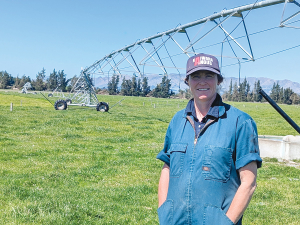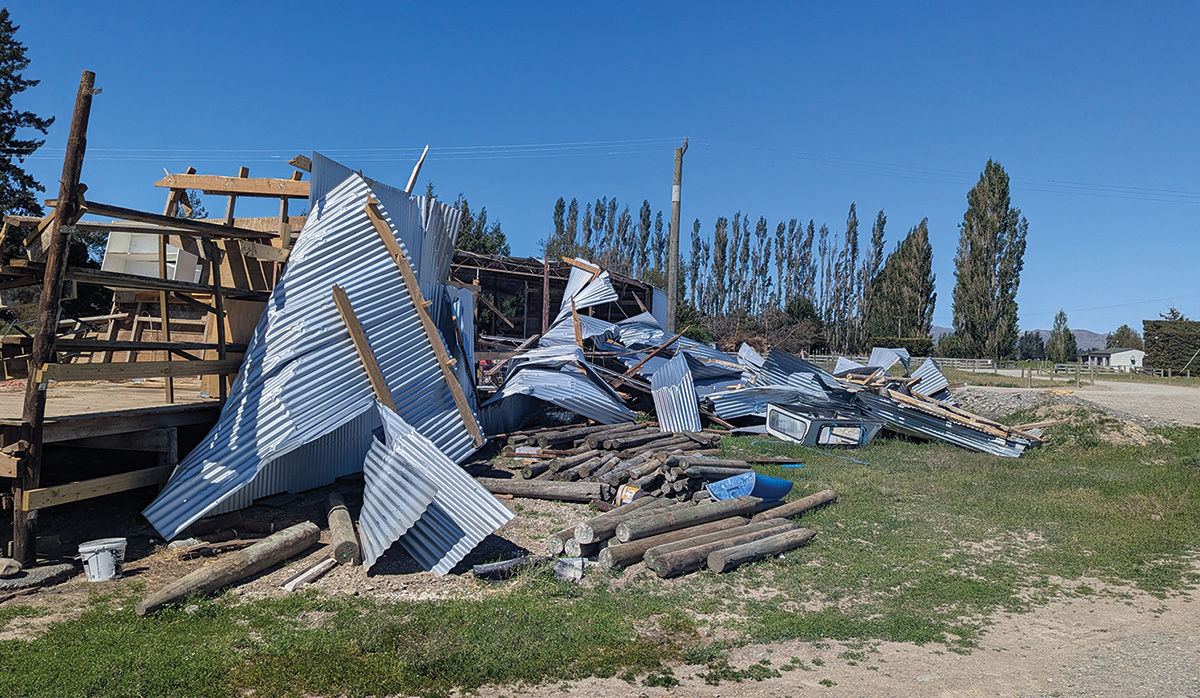Southland windstorm shows dairy farmers need backup generators
The recent windstorm that cut power to dairy farms across Southland for days has taught farmers one lesson – keep a generator handy on each farm.
 Culverden farmer Fran Gunn says toppled irrigation pivots will impact pasture growth in the coming weeks.
Culverden farmer Fran Gunn says toppled irrigation pivots will impact pasture growth in the coming weeks.
The effects of the big windstorm of late October will be felt in lost production in coming weeks as repair crews work through the backlog of toppled irrigation pivots, says Culverden dairy farmer Fran Gunn.
The unprecedented storm caused widespread damage to buildings, infrastructure and power supplies across a large swath of the country, including the Culverden basin, a dairying area with a high reliance on irrigation.
Gunn is contract milking about 900 cows on 240 hectares irrigated to the west of the Culverden township. The storm brought down many trees on the farm, blocking her access road and preventing milk pickup for one day. It also destroyed an implement shed and several spans of two irrigation pivots, which means she has lost about 70ha of irrigation.
“It’s definitely going to affect the grass growth. We’re just trying to plan for that now. We’ve still got good growth at the moment but it’s going to get dry, especially since there’s not a lot of rain in the forecast,” she said.
“It has stopped blowing such strong nor’west, which is good because that’s slowed down the drying out. But obviously we’ve got hot days now, so it’s going to change quickly.”
Gunn said the impact on production would come in three weeks or a month’s time if her irrigation isn’t back on by then.
“I guess the person they fix first will be back on, but it depends who the person they fix first is,” she adds with a smile.
Teams from her supplier, Waterforce, were working hard but had a lot to do.
“They’re going to try and reuse the bits that aren’t damaged, so they’re just doing inventory of what they need to fix each one. And then obviously the stuff that’s easy to get or is more important to put on - like the effluent pivots - they’ll fix sooner, just because it’s important to get that on.”
Waterforce Christchurch manager Paul Fairbrother said they had teams initially carrying out assessments and stripping damaged irrigators. In some cases, rebuilds had already begun and would continue in coming weeks.
Gunn said the wind seemed to come down a channel across the Culverden basin and a lot of people in certain parts had lost pivots. But probably no-one escaped without damage of some kind.
She said that at the height of the storm it was too dusty to see what was happening.
“When the wind calmed down, everything was everywhere.”
She said her farm has a lot of trees so probably looks worse than many farms without.
“If you look at the trees, like, they’re big old trees, they’ve seen a lot of wind and for them to fall over takes a bit of a push.”
 |
|---|
|
A shed on Fran Gunn's farm in Culverden demolished by the windstorm. |
Irrigators Damaged
IrrigationNZ said it had heard of up to 500 to 700 irrigator spans damaged, but was still working to form a clearer picture of numbers, as that was important to determine what extra support needed to be pulled in.
“Right now, we are facilitating relevant conversations with both government and suppliers to ensure farmers can get up and running as quickly as possible - there’s a joined focus on getting farmers ready for irrigation season, which is effectively now,” said Irrigation NZ communications manager Kathryn Healy.
Insurance Claims
The New Zealand Insurance Council reported around 5300 individual claims lodged across New Zealand as of November 3, with more expected as people continued to assess damage to their properties.
Many of the claims were for wind-related damage such as torn roofs, broken windows, and flying debris impacting buildings and vehicles.
The Insurance Council said insurers were working closely with those affected to support their recovery.
It said the wild weather was unlikely to have an immediate impact on premiums.
“However, insurers have consistently highlighted that as severe weather events become more frequent and intense, a collaborative effort led by government is needed to invest in risk reduction. This will help protect communities and ensure insurance remains accessible into the future.”
The executive general manager claims for AMI, State and NZI, Stephannie Ferris, said the three companies had received over 3000 claims across Southland, Otago, Canterbury and Wellington, including for smashed windows and doors, flying roofs and sheds, and also spoiled food as a result of power outages.
“For our rural customers, we’ve seen plenty of wind damage to farm buildings and a number of irrigators. At this stage, it’s too early to put a cost to these events,” she said.
As New Zealand marks the United Nations’ International Year of the Woman Farmer 2026 (IYWF 2026), industry leaders are challenging the misconception that women only support farming.
Fonterra’s impending exit from the Australian dairy industry is a major event but the story doesn’t change too much for farmers.
Expect greater collaboration between Massey University’s school of Agriculture and Environment and Ireland’s leading agriculture university, the University College of Dublin (UCD), in the future.
A partnership between Torere Macadamias Ltd and the Riddet Institute aims to unlock value from macadamia nuts while growing the next generation of Māori agribusiness researchers.
A new partnership between Dairy Women’s Network (DWN) and NZAgbiz aims to make evidence-based calf rearing practices accessible to all farm teams.
Despite some trying circumstances recently, the cherry season looks set to emerge on top of things.